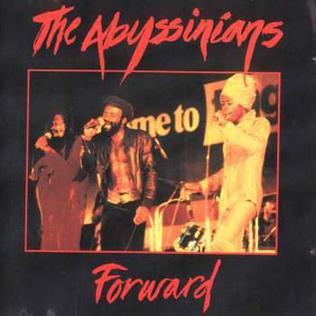Riddim is the Jamaican Patois pronunciation of the English word "rhythm". In the context of reggae and dancehall, it refers to the instrumental accompaniment to a song and is synonymous with the rhythm section. Jamaican music genres that use the term consist of the riddim plus the voicing sung by the deejay. The resulting song structure is distinctive in many ways. A given riddim, if popular, may be used in dozens—or even hundreds—of songs, not only in recordings but also in live performances.

Horace Andy is a Jamaican roots reggae songwriter and singer, known for his distinctive vocals and hit songs such as "Government Land", as well as "Angel", "Spying Glass" and "Five Man Army" with English trip hop duo Massive Attack. He is also famous for a cover version of "Ain't No Sunshine". Andy is often described as one of the most respected and influential singers in Jamaica.

The Ethiopians were one of Jamaica's best-loved harmony groups during the late ska, rocksteady and early reggae periods. Responsible for a significant number of hits between the mid-1960s and early 1970s, the group was also one of the first Jamaican acts to perform widely in Britain.
Heartbeat Records is an independent record label based in Burlington, Massachusetts. The label specializes in Jamaican music.
Blood and Fire is a British reggae record label specialising in reissues of 1970s dub.
Clive Hunt is a Jamaican reggae multi-instrumentist, arranger, composer and producer.

Leroy Sibbles is a Jamaican reggae musician and producer. He was the lead singer for The Heptones in the 1960s and 1970s.

The Gladiators are a Jamaican roots reggae band, most popular during the 1970s. The core was Albert Griffiths, Clinton Fearon and Gallimore Sutherland. Their two most famous albums are Trenchtown Mix Up (1976) and Proverbial Reggae (1978) with songs such as "Hearsay", "Jah Works", "Dreadlocks the Time is Now". "Mix Up", "Music Makers from Jamaica", and "Soul Rebel" – a song written by The Wailers. Gladiators also cooperated with the toaster U-Roy.
Keith Hudson, was a Jamaican reggae artist and record producer. He is known for his influence on the dub movement.
Me and You are a Jamaican reggae trio.
The Heptones are a Jamaican rocksteady and reggae vocal trio most active in the 1960s and early 1970s. They were one of the more significant trios of that era, and played a major role in the gradual transition between ska and rocksteady into reggae with their three-part harmonies. The Heptones were contemporaries of the Wailers and the Maytals, and every bit their equal in the mid-1960s.
Carlton and the Shoes are a Jamaican vocal group who had their greatest success in the late 1960s, as rocksteady gradually became reggae and are still active in 2008, most notably in Japan and Jamaica. The group had several Studio One recorded hits in Jamaica, most notably "Love me Forever" in 1968.

Forward is The Abyssinians' third album, released in 1982.
The In Crowd are a popular Jamaican reggae showband who had their commercial peak in the late 1970s, best known for the singles "We Play Reggae" and "Back a Yard". They split up in the 1980s but reformed in 2014 to record a new album.
The Maytones are a Jamaican reggae vocal duo who were active between the late 1960s and until 1980.

Satta Massagana is a roots reggae album released by The Abyssinians officially in 1976. It is widely considered The Abyssinians' crowning achievement and a classic roots reggae album.

Winston Jarrett is a Jamaican reggae singer who was part of Alton Ellis's group The Flames in the 1960s before recording with The Righteous Flames and as a solo artist.
The Viceroys, also known as The Voiceroys, The Interns, The Inturns, The Brothers, and The Hot Tops, are a reggae vocal group who first recorded in 1967. After releasing several albums in the late 1970s and early 1980s, they split up in the mid-1980s. They reformed and recorded a new album in 2006.
Kashief Lindo is a Jamaican reggae singer.

Third World is the 1976 debut album of the Jamaican reggae group Third World.










